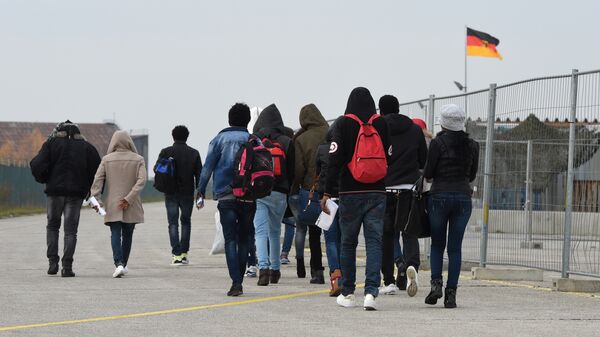Alexander Dobrindt, the CSU's parliamentary group leader, voiced his party’s "100 percent" support for the party's leader, German Interior Minister Horst Seehofer. Their proclaimed aim, according to Dobrindt, is to turn Germany's migration policy “upside down.”
"As we discussed, parts of the master plan are the direct responsibility of the interior minister, who comes from our ranks," Dobrindt said, as cited by Deutsche Welle.
According to the MP, the time to act has come; nothing can prevent them from “doing what we are allowed to do legally."
CDU/CSU Gap Growing
The schism between the two sister parties continues to grow, as the long time partners have failed to reach an agreement over the harder border checks proposed by the German Interior Minister in his "Masterplan for Migration." It overturns the principle of “open borders,” Angela Merkel's controversial signature migration policy.
The growing disagreement triggered speculation in the media that the coalition may be close to collapse because of the CSU. German newspaper Augsburger Allgemeine quoted an unnamed lawmaker as saying "We're not far off a break."
Seehofer's blueprint calls for some to be turned away on country’s national borders if they have been registered in other EU countries. The German Chancellor, who remains firmly opposed to the policy, is reportedly planning to take the issue to the European level ahead of the EU summit at the end of June. Merkel told the press she expects that “we will all do it together, the federal government included."
"I personally think illegal migration is one of the big challenges for the European Union so I don't believe we should act unilaterally, we should not act in an uncoordinated way and we should not act at the expense of third parties," German Chancellor Angela Merkel said during a press conference.
Meanwhile, the CSU insists that the chancellor's office agrees on the proposition till June 18, otherwise Federal Interior Minister Horst Seehofer (CSU) will act within his own authority.
Since 2015, Europe has been struggling to cope with the effects of an influx of refugees, with hundreds of thousands of migrants fleeing war and social crises in the Middle East and Africa.
READ MORE: Jewish Girl's Murder in Germany Fuels Anti-Migrant Sentiment
Although Brussels introduced special quotas so that migrants to the block be distributed more evenly, some European governments have refused to follow the regulations, and are calling for closed borders and tougher measures toward the newcomers.
According to the European statistics office Eurostat, Germany took in 325,400 refugees in 2017, accounting for almost 60 percent of the 540,000 migrants resettled last year. The statistics office said that about 33 percent of the migrants were from Syria, followed by Afghanistan, which accounted for 19 percent of the refugees. Refugees from Iraq accounted for 12 percent.





